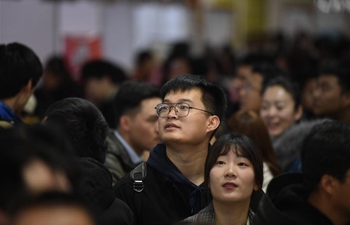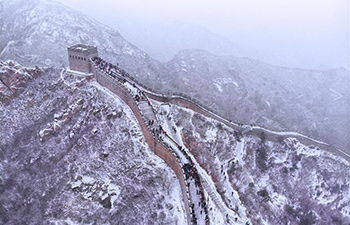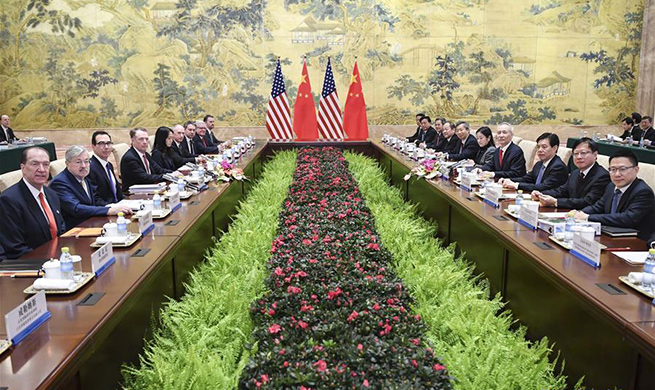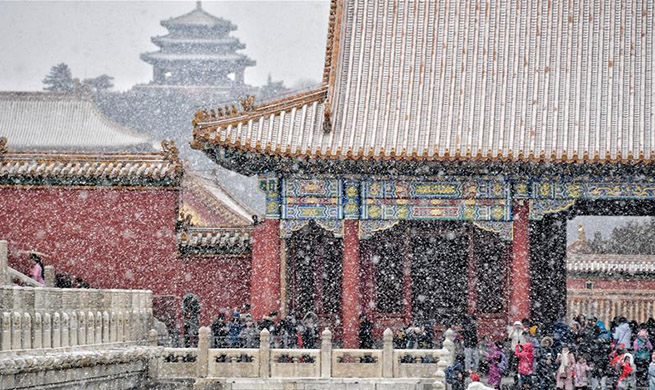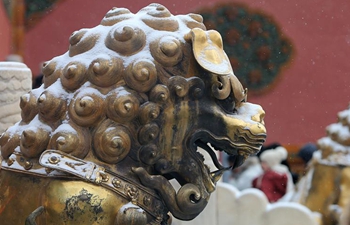BEIJING, Feb. 15 (Xinhua) -- China on Friday reported milder inflation in January due to weaker food price growth and lower oil prices, leaving more room for authorities to maneuver monetary policies.
Consumer price index (CPI), a main gauge of inflation, rose 1.7 percent year on year in January, compared with 1.9-percent growth in December, data from the National Bureau of Statistics (NBS) showed.
Asian investment bank Nomura attributed the lower CPI growth to food prices, which climbed 1.9 percent year on year last month, down 0.6 percentage points from December.
The price of pork, the staple meat for Chinese consumers, fell 3.2 percent year on year in January, a sharper decline than the 1.5-percent drop recorded in December.
On a month-on-month basis, the pork price dipped 1 percent, the NBS said, citing increased supplies as authorities removed the blockade for African swine fever in some regions.
As a result of cold weather and strong demand ahead of the Spring Festival, the price rises of fresh vegetables, fruits, aquatic products, mutton, beef and eggs contributed 0.34 percentage points to the year-on-year CPI growth.
However, "the year-on-year growth in food prices during the weeks ahead of the Spring Festival was still milder than that in the pre-festival period last year, reflecting muted demand," said Yue Charles Yuan, a researcher with the investment bank China International Capital Corporation (CICC).
Meanwhile, gasoline and diesel prices declined for the second month in a row, down 6.2 percent and 6.5 percent year on year, respectively, after international oil prices fell.
With food and energy prices deducted, core CPI growth ticked up to 1.9 percent year on year in January from 1.8 percent in December, according to a Nomura analysis note.
Friday's data also showed that producer price index (PPI), which measures costs for goods at the factory gate, edged up 0.1 percent year on year in January, down from an increase of 0.9 percent recorded in December.
Upstream sectors continued to lead a moderation of the PPI growth, according to Nomura.
For major industrial sectors, the PPI in oil and natural gas exploration dipped 5 percent, compared with an increase in December, the NBS data showed.
The CICC expected the inflation to stay in the mild territory in the future, anticipating a CPI growth of around 1 percent and an approximately flat PPI in February.
"Further decline of inflation, combined with a more dovish stance by the U.S. Federal Reserve, justifies further monetary loosening in China this year," Yuan said.
China will keep its prudent monetary policy "neither too tight nor too loose" while maintaining market liquidity at a reasonably ample level in 2019, according to the annual Central Economic Work Conference held in December.
China Merchants Securities believes the effect of low oil prices on inflation will "weaken markedly" in the future as global oil prices have already started to rebound.
"If the international oil prices go up further, the risk of higher inflation can't be ruled out," the securities firm said in a research note.
China's CPI rose 2.1 percent year on year in 2018, up from 1.6 percent for 2017. The growth exceeded 2 percent for the first time in the past four years , but remained well below the government's target of around 3 percent in 2018.






